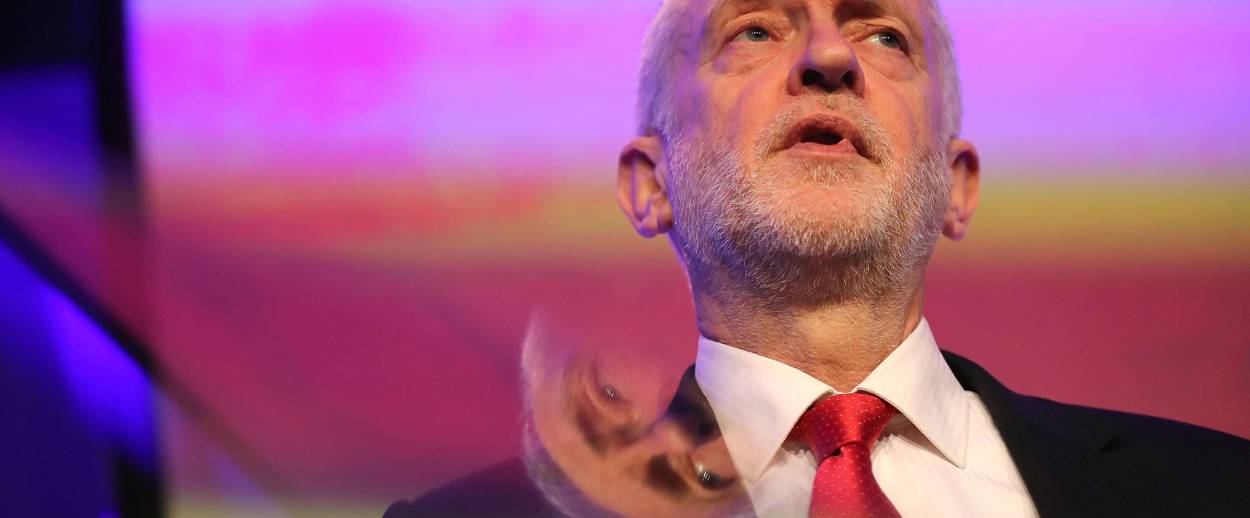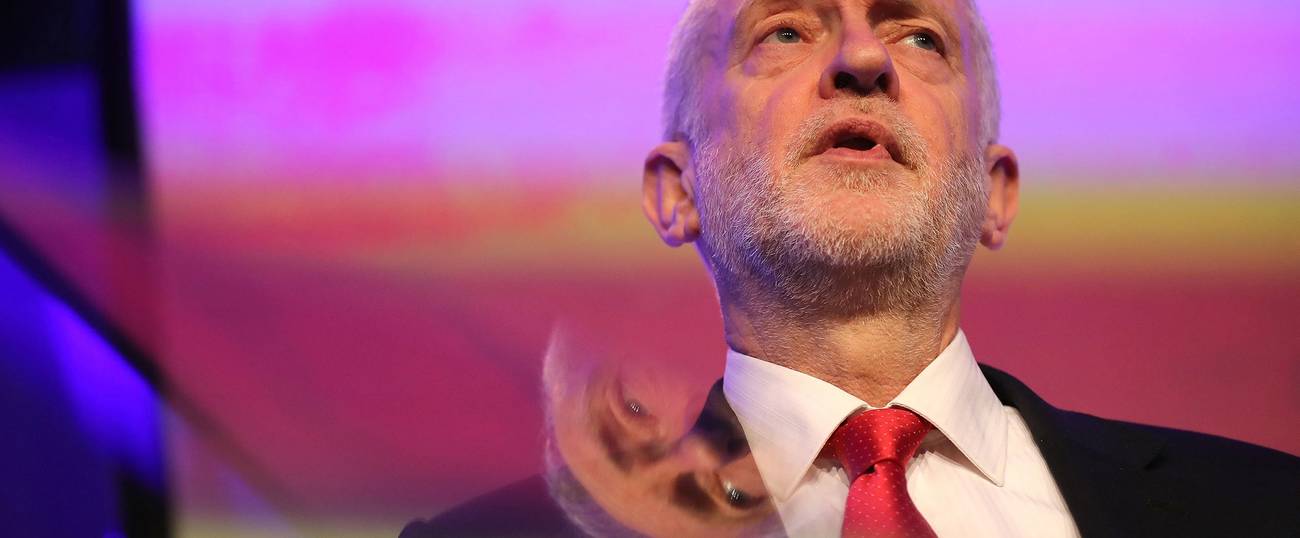The anti-Semitism scandal that has engulfed Jeremy Corbyn is now having clear electoral consequences for the Labour Party in Britain, leading to the loss of a key council seat in Barnet and three seats in West Hendon. Americans who care about progressive causes but reflexively downplay and brush aside the real existence of anti-Semitism on the left as well as the right would be wise to take note. It can happen here, too.
While bigots and conspiracy theorists continue to target Jews far in excess of any other religious minorities in America, a combination of neo-Nazi events like Charlottesville and ongoing allegations of anti-Semitism against high-profile progressives has shaken confidence that either the political left or the right are staked in protecting our community. Instead, we see that anti-Semitism is becoming part of mainstream discourse across party lines. Those of us on the left have an obligation to stand up and stop it from derailing and destroying the justice movements we have helped to build, and continue to be a vital part of in the United States.
There are those who say anti-Semitism can be ignored as a “side issue” in Trump’s America, and that there are too many vulnerable people in too much peril for us to be “distracted” or “divided” by focusing on anti-Jewish hate. They are mistaken. Hate emboldens hate. As Eric K. Ward has written here, anti-Semitism fuels white supremacy. In fact, anti-Semitism is the core ideological foundation of white supremacist ideology in Trump’s America. If we ignore the smoke of anti-Semitism rising, the American progressive movement will find itself engulfed in flames.
The first step to fighting hate is publicly naming it. We must hold our heads up and call out anti-Semitism when it rears its ugly head. We must do this in a way that is nonpartisan, and holds those we work with, organize with, and socialize with equally accountable.
Last week, a progressive Orthodox Rabbi, Shmuel Herzfeld, stormed a D.C. City Council meeting and shamed D.C. City Council members for not taking action against anti-Semitism in Washington, and not condemning some of the blatantly anti-Semitic remarks of city officials and some of its own members. It was a stunning moment, in which Herzfeld demanded that the safety of him and his children be taken seriously. He demanded accountability. Within hours, Joshua Lopez, the city official who had organized a “unity rally” filled with hate speech on the steps of D.C. City Council, had resigned.
Herzfeld’s action is one more proof that our voices matter, and that we must raise them. In order to beat anti-Semitism, we must name this ancient hatred out loud, in defiance of attempts by our enemies or our purported allies to disempower and silence us. We must demand accountability with our voices, our hours, our votes, and our dollars. American Jews vote in extremely high numbers—some estimate as high as 96 percent—and overwhelmingly, we vote Democratic. Jews vote, donate, and volunteer on campaigns at disproportionately high rates. This means policymakers will listen to us, and so will grasstops leaders. As Jews begin to raise our voices in defense of our community and exert political pressure, progressive leaders of grassroots organizations who do not rise to the occasion will lose influence over policymakers.
After we name it, we must sit with it. It’s painful and counterintuitive, but as we call out the hatred, we must seek to call in the person. We need to build grassroots spaces where policymakers, community members, community leadership, organizers, advocates, and faith leaders can all gather together to talk openly and learn. We live in a white supremacist, Christian-normative world that we must actively try to dismantle. But we need to build, not just break. We need to create space for learning about each other and each other’s histories, fears, and goals. These spaces can also create opportunities for anti-oppression work within our community and can create stronger, more just, holier Jewish communities with better bonds with the larger American community.
When we refuse to engage, we cede space and power. And if we don’t raise our voices, we will be horrified at those who step in to fill the void.
We cannot allow the voice of the Jewish left to become token “progressive Jews” who provide their movements with a kosher stamp for tolerating and ignoring real anti-Semitism, but who are wildly out of step with our communal values and beliefs, like Jewish Voice for Peace. While many of us are deeply critical of Israeli Prime Minister Bibi Netanyahu both in terms of policy and rhetoric, nearly 70 percent of American Jews feel attached to Israel. Anti-Semitism and criticism of Israel are not the same, but it is very common for anti-Semitism to claim anti-Zionism as its first line of defense—and then to protest that “criticism of Israel” is “not allowed,” and then blame Israel for hideous blood-libel-like crimes on flimsy or nonexistent evidence. Only 12 percent of American Jews believe that Palestinian leadership is sincere in its efforts for peace. We take the violent, Holocaust-denying, eliminationist rhetoric of the Palestinian leadership every bit as seriously as we take the violent, racist rhetoric of some settler leaders on the West Bank. An overwhelming number of American Jews see Israel’s flaws clearly, as we see America’s flaws—but we do not believe that Israel is a genocidal, colonial state.
Such rhetoric spoken in our name is tokenization, pure and simple. We must push back against tokenization, which is a form of dehumanization, and demand that voices that are representative of mainstream Jewish views be empowered and respected within the progressive community. Just as we name anti-Semitism, we must also name tokenization and refuse to cede space in the movement to extremists. I believe as we push back we will find avenues for partnership with moderate voices on issues such as human rights for asylum seekers in Israel and concerns about political corruption and inequality. Engagement can be painful, but it is the only option if we are going to stop the left from being overrun by anti-Semitism, anti-Zionism, and tokenization.
As we are naming hatred, and flexing our political muscle to demand accountability, and pushing for true representation and empowerment, it is important that we center on those members of our community who are truly the most vulnerable. We must stand with members of the Lubavitch community in the face of street violence. We must stand with those who cannot “pass” and are targeted with violent anti-Semitism. We must be sensitive to the unique pain and fear that Jews of Color, multiracial Jews, and their families face when tensions between communities are running high. We must remember to call out the homophobia that often stands alongside anti-Semitism. We must be the model of intersectionality that progressive leaders are abandoning. We must hold ourselves to the high standard that they have failed to achieve.
Jews have been at the forefront of progressive causes in America for over a century. From labor rights to feminism to LGBTQ issues to civil rights to Democratic party politics, Jews—as individuals, and as members of our communities—have made enormous contributions to creating a more just America.
American Jews yearn for justice, and many find just as much spiritual meaning in our justice-work as we do in our synagogues. We want to live our Jewish values in our daily lives, which is why we bring our hearts and souls into justice-work. We should be able to continue the work of creating a more just country. That’s been part of our Jewish calling in America from the Triangle Shirtwaist Factory fire to Mississippi Freedom Summer to the March for Our Lives. The progressive community should stand with us, because we are built into its historic fabric, and because standing together in opposition to hate defines resisting Trump.
That said, our presence is being taken for granted, and it is not a given. Progressive leaders must not assume our votes, dollars, and brainpower are their natural inheritance, because we are too scared to speak up for ourselves when we are the targets. If we cannot have a home in the progressive movement, we will build one elsewhere. We will protect our children from hate—even when that hate comes from the left.
In Britain, Jews are beginning to stay home or vote Tory because they simply can’t stomach the anti-Semitism that has been allowed to take root and flourish in the Labour Party, despite repeated denials by party leaders and activists that the problem is real. Now that the problem is clearly real, only a handful of Jews remain in the Labour Party.
Anti-Semitism is a sickness that must be ripped out at the root. This will mean painful personal evolution and some culture-shifting from movements, but the alternative, an American left without progressive Jews, is unfathomable to both Jews and true progressives. We must name and engage on anti-Semitism, or both the movements and our communities will be imperiled. If we stay silent, we will all lose.
You can help support Tablet’s unique brand of Jewish journalism. Click here to donate today.

